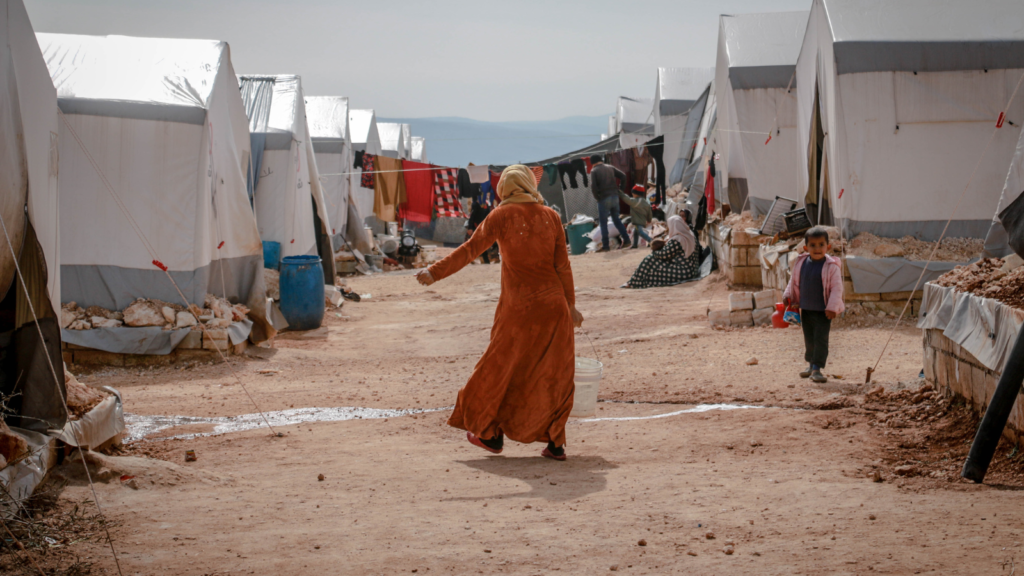In recent years forced migration has been getting increasingly worse. According to UNHCR, the number of people forced from their homes by persecution, conflict, human rights violations or generalised violence has more than doubled in the last decade, reaching 108.4 million by the end of 2022[1].
Conflict is not the only factor in forced migration with the reasons behind migration complex and multifaceted. However, conflict is often one of the macro factors, influencing and impacting others such as infrastructure, social relations and the local and regional economy (which in turn all influence the risk of conflict but that is another article). Conflict impacts access to food and water, destroys shelter and family ties and removes the emotional stability of peace and security. Functioning institutions have been constructed to counter these risk factors. In fact, the development of institutions can also be read as the history of risk mitigation. Institutions provide safety, protection, justice and peace through process and certainty, all of which are key in mitigating the risk of conflict and therefore forced migration.
To break the cycle of conflict and migration states and other civil society actors must focus on the targets set out under the banner of Sustainable Development Goal 16: Peace, Justice and Strong institutions. Realising these goals is a route to stable peace in unstable countries and as such, a tool for ending the cycle of conflict and forced migration that has become all too commonplace in parts of the world. Recently we’ve seen mass forced migration in Syria, Nigeria, Yemen, Afghanistan and Ukraine all largely due to violence and the fall-out from it, such as food insecurity and destruction of infrastructure and services.
Capacity building and social enfranchisement
Countries with strong institutions are less likely to see conflict and even less likely to see sustained conflict. Therefore, it is essential as a global community that we begin to make progress on the targets set under the banner of SDG 16. Target 16A seeks to strengthen relevant national institutions, including through international cooperation, for building capacity at all levels, in particular in developing countries, to prevent violence and combat terrorism and crime. Capacity building is essential for creating and developing strong institutions that provide the basis for a consistent and stable society.
Essential to social enfranchisement is the construction of efficient and transparent institutions that the public deem to be representative and accountable. Institutions that appear to be corrupt or self-interested will quickly lose the support of the population, thus losing the legitimacy and authority to govern. This is dangerous at a national and regional level and provides opportunities for insurgent groups to recruit disenfranchised individuals. Institutional weakness is often purported to be one of the key factors in Islamic extremist recruitment policy – economically and socially disenfranchised youths looking for income and belonging that they don’t receive from eroded and in some cases, collapsed systems of government[2]. Much of the forced migration in Northern Nigeria has been at least in large part, the result of Islamic extremist groups such as Boko Haram terrorising the area around Maiduguri as part of an extension of hostilities perpetrated by Sahelian extremist groups that make incursions into Nigeria and other nearby states where border security is lacking. Similarly in Mozambique, in Cabo Del Gado in the north of the country, Islamic extremism has dovetailed with a series of natural disasters to create a significant flow of forced migration.
Target 16.3, the promotion of law domestically and internationally, is key to social and global enfranchisement. We can see the positive effects of justice enfranchisement in Colombia, where the FARC rebel group finally signed a 2016 peace treaty and were granted an amnesty, with a number of their leaders now hold important political roles. This would not have happened without domestic political, legal and justice systems operating effectively and supported by the needs of the people. Until the peace treaty Colombia was one of the biggest producers of forced migrants, with over 7.4 million Colombians internally displaced by 2017[3] and hundreds of thousands flowing into neighbouring countries such as Venezuela. The painful irony now is, of course, as Venezuela’s institutions are degraded by an illegitimate government, Venezuela has now become one of the biggest sources of internal displacement and external migration fleeing political violence and an insecure economic environment.
Building capacity in host countries
Three quarters of those forcibly displaced externally are hosted in low and middle income countries, so it is essential that progress is made on target 16.8 to broaden and strengthen the participation of developing countries in the institutions of global governance. By so doing, host countries will have better access to international resources and have greater internal capacity and therefore better placed to manage the flow of migrants and deal with issues that arise. Neighbouring countries are also essential for managing the intensity of internal conflicts. They have a mediation role to play as well as often aiding one side or the other. Deeper participation in global governance will build mediation capacity and an interest in ending hostilities quickly.
The Democratic Republic of Congo (DRC) has historically been both a producer of mass forced migrants and refugees and also a host country for refugees. During the Rwandan civil war and genocide in 1994, thousands of Rwandans crossed the border into the North Kivu region of DRC. Subsequently during the DRC civil war of 1998-2002, and regular outbreaks of political violence in the ensuing two decades, people have been forced from their homes into Uganda, Rwanda, Tanzania and Zambia, leaving 1.1 million refugees and asylum-seekers externally displaced and 5.5 million people internally displaced as of 2022[4].
Mediation during the 1998-2002 civil war was largely undertaken by the Southern African Development Community (SADC) countries with leading roles played by South Africa and Zambia, supported by the United Nations. The four-year mediation process resulted in the 1999 Lusaka Agreement which was partially successful in disarming militia groups and restoring DRCs territorial integrity. However, ongoing skirmishes at the DRC/Uganda/Rwanda border with rebel groups taking advantage of the distant Kinshasa government’s inability to enforce agreements and lack of local institutions to monitor and uphold them means forced migration continues to be an ongoing facet of life for the people of that region.
Conclusion
Achieving the sustainable development goals, even in their totality will not fix the issue of conflict-based migration. Ending conflict is a notoriously tricky thing to achieve, with most peace agreements not holding and the causes of conflict surpassing the targets set out in the SDGs. However, they do represent a more holistic attempt to address an issue that has historically been piecemeal, albeit requiring commitments from a variety of both state and non-state actors. Additionally, they offer targets without ulterior motives, created via committee and hosted by an (arguably) impartial entity in the UN and removed from the desires of self-interested national and regional actors, that we can crystalise support around as a global community.
The recent SDG 16 conference, SDG 16 as a Compass for Navigating Intersecting Crises, reviewed progress and challenges related to SDG 16, with a focus on conflict and trust in public institutions. Now is the perfect time to crystalise plans to achieve the targets set out, boost social enfranchisement, trust in institutions and reduce the instances of, and opportunity for, armed conflict.
[1] https://www.unhcr.org/global-trends-report-2022
[2] Paul Stronski, 2016, Carnegie Endowment for International Peace accessed at: https://carnegieendowment.org/2016/03/30/biggest-recruiting-tool-for-extremist-groups-is-disenfranchisement-pub-63212
[3] https://www.unhcr.org/news/briefing-notes/forced-displacement-growing-colombia-despite-peace-agreement
[4] https://reporting.unhcr.org/operational/situations/democratic-republic-congo-situation




